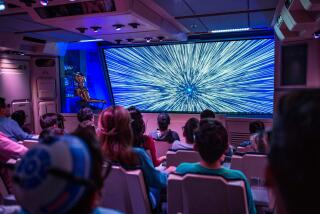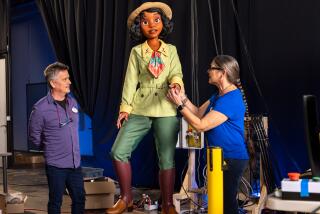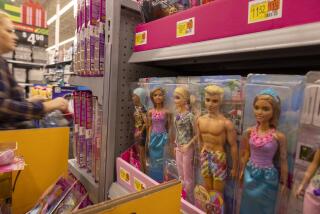Disney delves further into 3-D printing with MakieLab deal on doll outfits
Walt Disney Co.’s merchandise machine is meeting up with the 3-D printing industry.
On Friday, 3-D-printed doll designer MakieLab begins selling doll outfits that feature patterns of Disney’s Minnie Mouse and Maleficent.
Here’s how it works: A kid goes to the MakieLab site online and picks out a basic doll design; customizes it for hair, eye color, and skin tone; picks out some clothes, and sends the design to MakieLab. The company prints out a physical, 3-D doll on a six-foot-by-eight-foot industrial 3-D printer, dresses it and ships it back.
MakieLab, based in London with an office in Los Angeles, also has plans with Disney to personalize Star Darlings merchandise, a new Disney brand.
Disney Chief Strategy Officer Kevin Mayer called 3-D printing “a future technology that’s going to be important to us as a company.” Disney products personalized for children — imprinted with their name, for instance — do well at Disney theme parks and in Disney stores. But 3-D printing offers much more detailed and sophisticated personalization, and can be easily customized and ordered from home.
Already, Disney has used 3-D printing in theme parks and retailers, where kids, for example, can get their faces printed on “Star Wars” or “Iron Man” merchandise. The technology isn’t the only innovation.
So too is the Disney Accelerator program, where young companies like MakieLab can operate outside the confines of a big bureaucracy. MakieLab was one of two 3-D printing companies Disney invested in and assisted this year as part of Disney Accelerator powered by Techstars, which has had 20 companies pass through over two summers.
The other 3-D printing company is Open Bionics, a prosthetics maker working with Disney on character-based limbs that might bring cheer to children who need them.
Next year, Open Bionics hopes to gain FDA approval for sensor-equipped, flexible prosthetic hands. The made-to-order devices will resemble Iron Man’s gloves or snowflakes from “Frozen,” for example. The start-up estimates 10,000 children worldwide could benefit from the initial product.
Disney isn’t charging Open Bionics for royalties. It’s easy to “empathize with any kid who watches a superhero movie and wants to be the main character,” Open Bionics Chief Executive Joel Gibbard said.
Disney Accelerator already has turned out a big success: Electronic toymaker Sphero’s ball-shaped robot based on the “Star Wars” BB-8 character quickly sold out after recently launching.
Chat with me on Twitter @peard33







